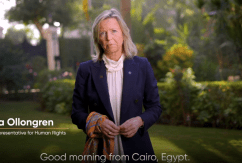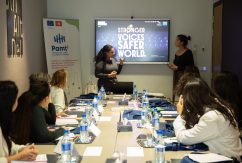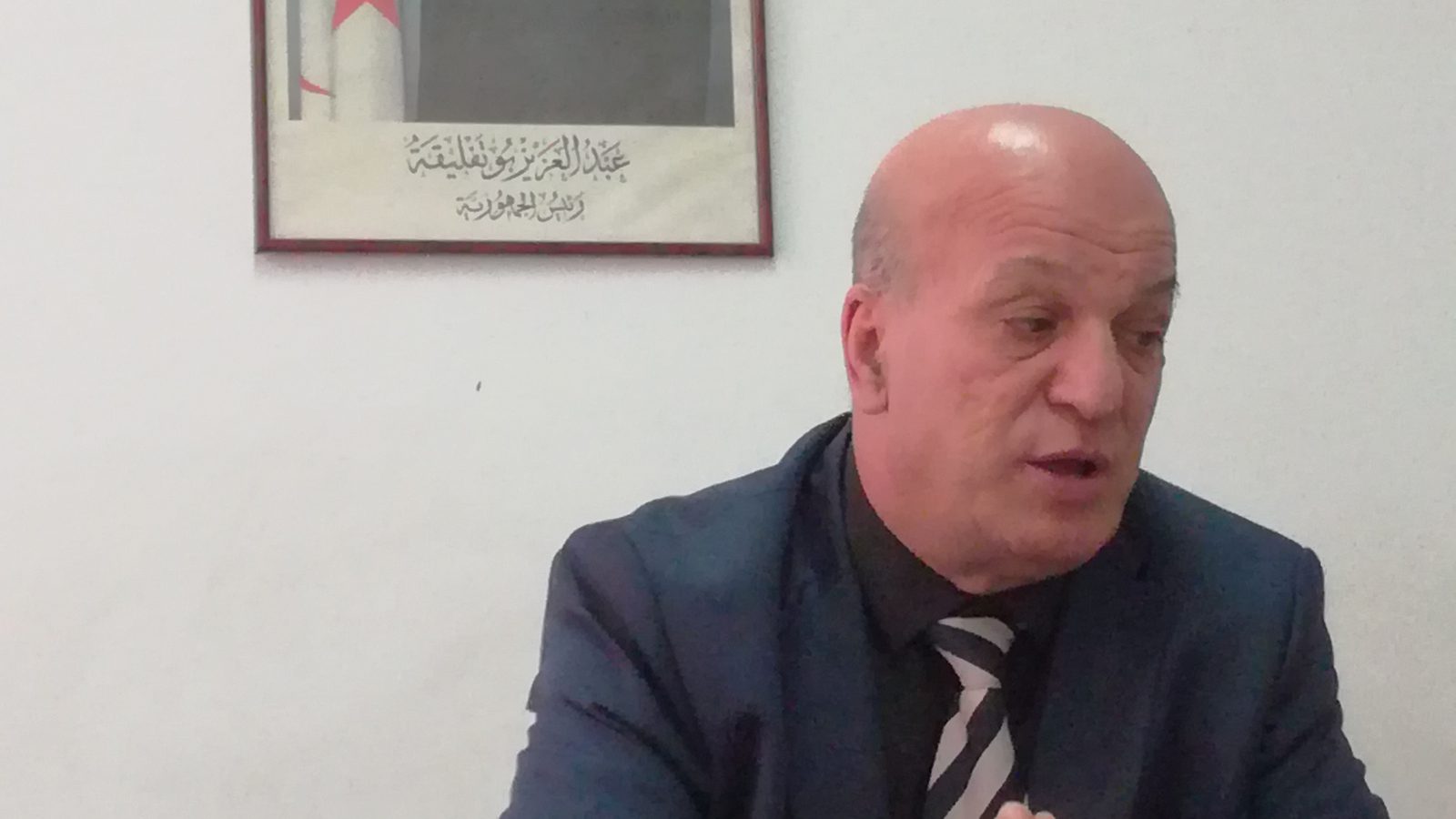Institutional twinning between France and Algeria to promote the professional integration of people with disabilities
Fostering a paradigm shift towards equal access to the world of work
Launched in January 2017, the France-Algeria institutional twinning programme “Support for strengthening the Capacities of the MSNFCF (Ministry for National Solidarity, Family and Women) in their comprehensive strategy for promoting the integration of people with disabilities in the workplace” is due to end in January 2019. With 1.2 million euros in European Union funding, this project has offered the Algerian authorities technical support in the promotion of employment rights for people with disabilities.
Standing tall in his white boots, Ryadh is proud to show me the rose garden of Frantz Fanon Hospital. The hospital, named after the famous anticolonial psychologist, is located in Blida (50km South of Alger), on the Mitidja Plain. Ryadh has suffered from psychiatric disorders since an early age, but his illness does not prevent him from regularly coming to work in the rose greenhouses situated on a patch of land kindly made available to the Blida Association for the Support of the Mentally Ill (ABAMM).
“I like coming here. I like cultivating roses and tending to the olive trees. I get up early to catch the bus, and if it’s raining, like today, I bring my umbrella”, explains Ryadh, under the watchful eye of Doctor Nasr-Eddine Saoudi, secretary-general of the ABAMM and director of the upcoming Experimental Vocational Rehabilitation Centre (CATEX). “Ryadh is one of a group of around ten patients who come here during the week to take part in agricultural activities in a safe setting. The fact that he can come here alone demonstrates that he has achieved a level of independence through occupational therapy”, stresses Dr Saoudi.
This association has now been helping mentally ill people and their families for over 15 years.
Thanks to the France-Algeria institutional twinning project, funded by the European Union and aiming to provide, “Support for strengthening the Capacities of the MSNFCF (Ministry for National Solidarity, Family and Women) in their comprehensive strategy for promoting the integration of people with disabilities in the workplace”, the ABAMM is preparing to embark on a pilot project, unique in Algeria, in the field of employability of people with disabilities.
In the footsteps of Fanon
The roses grown by patients are sold at a small kiosk located at the hospital entrance. If they don’t find a buyer, the flowers are destroyed. This gave Françoise Jay-Rayon, a twinning advisor on the French side, an idea for creating financially profitable employment for disabled people in a protected setting. “Before long, Damask roses will bloom in these greenhouses and their petals will be used to produce rose essential oil. Fanon wanted to get mentally ill patients out of hospital. For our part, we have succeeded in bringing business into the hospital. On 8 October 2018, members of the Mitidja Enterprise Club attended a meeting on hospital premises. Demonstrating to business leaders that people with disabilities can work is the greatest homage we could pay Frantz Fanon”, observes Dr Jay-Rayon, with a beaming grin.
In just a few weeks, the people behind the future Experimental Vocational Rehabilitation Centre have managed to find an appropriate means of tackling the challenge. Local government officials, doctors, experts and members of the association have all asserted that the future commercial activity does not contravene current legislation, and that all appropriate measures will be taken to provide former patients with good working conditions and the chance to become paid workers, saving for their retirement. In order to do so, they have implemented a pilot agreement, drawn up by two experts from the twinning scheme. The purpose of the document is to enable the creation of a Vocational Rehabilitation Centre in partnership between the Ministry for National Solidarity, the Ministry for Professional Education and Training and the Directorate of Social Action and Solidarity (DASS).
Next, they needed to attract a company ready to accept the challenge. “We approached a young entrepreneur who produces organic essential oils. The company director immediately accepted our offer to grow roses on hospital grounds, employing people with disabilities. In the first meeting, he even sketched the bottle and packaging for the future essential oil, clearly stating “oil produced by people with disabilities”. He is aware and proud of how this information could set the product apart,” notes Dr Jay-Rayon.
A doctor and inspector general of public health in France, she believes that it is important to safeguard the rights of the future workers. “We must be mindful that major financial interests are involved, as the rose essential oil will be exported, and it is a very expensive product”. Entering fully into the spirit of Fanon, she has suggested refurbishing the famous Café Maure, a social space created by the militant psychiatrist in the 1950s. The aim is to create a genuine cultural centre, a space open to artists, symbolising the inclusive society that this project could help start to build.
Nasr-Eddine Saoudi, the future director of the CATEX is fully aware of the task ahead. “We are lucky to have an excellent relationship with hospital management. As such, we have just obtained an official document certifying that the farmland is being made available to the association and the CATEX”.
Intersectoral action and cooperation across the board
The current initiatives at Blida represent just one of many implemented under the institutional twinning scheme, which has a 1.2-million-euro budget and is set to end in 2019 after two years of activity. Ali Zerrougui Nabaoui, director of Prevention and Workplace Integration of Disabled People at the Ministry for National Solidarity and head of the twinning scheme on the Algerian side, stresses that the question of integrating disabled people into the workforce must be tackled through an intersectoral approach, in close cooperation with the third sector.
“This issue must be handled on a global scale, with the participation of all relevant ministerial departments. At the end of this twinning project, we are now aware of the nature of our weaknesses and the actions we must take to remedy them. These weaknesses are legal and organisation, as well as a lack of skills in certain fields. The experts involved in the twinning scheme have also worked with civil society, which is a key stakeholder in integration initiatives”, states Ali Zerrougui Nabaoui.
Cooperation between the various departments has been facilitated by the presence of “focal points”, responsible for questions of disability, in almost all Algerian government ministries. “We have discovered that in Algeria, there is a focal point for disabled people in each ministerial department. This is an absolutely extraordinary structure, which we are not familiar with in France”, acknowledges Dr Jay-Rayon. The institutional twinning project has, however, committed to organising meetings between employees in order to ensure inter-sectorial cooperation.
What’s more, interaction with third sector organisations has required a “special approach” due to a lack of detailed knowledge of regulation by a number of charities. Dr Jay-Rayon alludes to “false rumours” concerning a ban on access to employment for certain categories of disabled people. “An expert who worked with charities belonging to the National Council for Disabled Persons heard someone explain ‘we have agreements with Vocational Rehabilitation Centres, but the people who come to us, in particular those with mental disabilities, do not have the right to work’. We were in a very uncomfortable situation, because professional integration in collaboration with the charity sector is a major focus of our project. Fortunately, Mr. Nabaoui refuted what we believe to be a “false rumour”.
The charities were convinced that because the people they worked with were so marginalised, these groups didn’t have the right to work. It is for this reason that we must, first and foremost, bring about a paradigm shift, clearly affirming that there is no legal text banning disabled people from working and, gradually, becoming independent”.
The work done by Ryadh and his colleagues on a daily basis in the Frantz Fanon Hospital rose garden disproves this ‘false rumour’ in tangible terms.
The institutional twinning programme has also made it possible to lay the foundations for a partnership between the world of business and various institutional stakeholders responsible for the integration of disabled people in the workplace. A “Memorandum of Understanding on the Employment of Disabled Persons” was drawn up with the assistance of experts from the twinning project. Article 6 of this text states that signatory companies must “clearly demonstrate their commitment to promoting access to employment for disabled people”.
“Nine other employers, as well as the Trade Union federation have shown an interest in the initiative. This memorandum is quite flexible and enables us to find solutions in direct cooperation with all stakeholders. We hope that the agreement will be signed by all of the parties at the closing ceremony of the twinning project”, explains Ali Zerrougui Nabaoui.
Harmonisation
Any comprehensive strategy aiming to improve the integration of disabled people in the workplace must be underpinned by a clear legal framework. Therefore, amendment of the law governing the National Council for disabled persons has been a priority. The new text will decentralise decision-making through the creation of local offices. The decree governing this body is currently at the research stage. “We have also decided to create a national body responsible for the promotion and integration of disabled people. The creation of this institution, which also manages funds, should be enshrined in the 2020 Finance Act”.
But it is the law on the protection and promotion of disabled persons that, more than any other, requires extensive amendment. Implemented in 2002 – four years before the UN General Assembly adopted the Convention on the Rights of Persons with Disabilities – this Algerian law fails to fulfil the principles of “full enjoyment by persons with disabilities and their active participation in political, economic, social and cultural life.” Furthermore, the new law must clearly forbid all discrimination based on the disability in terms of access to employment. “It is currently under revision and should be finalised very soon”, assures Ali Zerrougui Nabaoui.
This initial institutional twinning project with the Ministry for National Solidarity, Family and Women is set to finish at the end of January 2019. According to Ali Zerrougui Nabaoui, it would be wise to strengthen cooperation with the EU countries through a new project.
“We still need certain expertise, particularly in terms of establishing the nationwide body responsible for the promotion and integration of people with disabilities. We could also take advantage of European experience in adapting workstations within companies. This activity requires real technical skill, as it is necessary to tailor the adaptations to each individual disabled person”.
Ryadh keeps his distance from all these legislative and administrative changes, which will soon have an influence on his daily life and those of thousands of people living with disabilities in Algeria. Soon, his agricultural work will allow him to earn a wage and live with dignity as an equal citizen, while continuing to receive care from public health professionals. Dr Jay-Rayon – who was born in Alger – does not intend to stray far from the Mitidja Plane. She can’t wait to smell the first drops of essential oil from the Frantz Fanon Hospital rose garden.





























 Syria
Syria 























